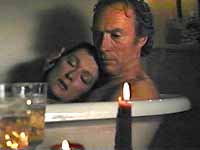Kincaid: I can't...
Francesca: You're blushing.
Kincaid: (rubbing his backside) Well, it's a very painful subject, a very...sore subject.
Francesca: what happened?
Kincaid: We became engaged.
Francesca: You should write these stories down.
Kincaid: Well, I would, except this is a female gorilla, see, she had a little eyeshadow, and a little lip gloss on her little lips, just (makes kissing noises). We still write.
Left turn, Clyde! Reminders of working with the lower rungs of the primate family must be very painful indeed for an auteur who spent a few years making Orangutan jokes for cash. There is also a telling moment, added for the film, in which Kincaid puts several huge cases of film in Francesca's refrigerator, saying that "the heat out there isn't too forgiving."

Meryl Streep and Clint Eastwood
in The Bridges of Madison County.
But, like Will Munny, Eastwood's Kincaid ultimately stops short of asking for forgiveness for his sins. His Kincaid has "a little bit of a problem with this American family ethic that seems to have hypnotized the whole country." He thinks that "there's too much 'this is mine,' or 'he or she is mine'--there's too many lines being drawn." He admires Africa for "the cohabitation of man and beast and beast and beast" because "there's no judgment about it, no imposed morality. It's just the way it is. It's beautiful, really, there's nothing like it. It's a voyeur's paradise." In the end, he thinks of his craft as a tool useful only in its present, saying, "I figure that why I make pictures, the reason I come up with, is it just seems that I've been making my way here." Further, he outright refuses to prostrate himself to his past: "I'm not gonna apologize for who I am, and I'm not gonna be made to feel like I've done something wrong."
But Francesca, the lonely housewife, Kincaid's immediate audience, and perhaps a reductionist prototype for the audience of this kind of romance story, is Kincaid's worst critic. She tells him,
"No, you're not going to be made to feel anything period, because you have carved out this little part for yourself in the world, and you get to be a voyeur and a hermit and a lover when you feel like it. And the rest of us are supposed to be so incredibly grateful for this brief moment that you touched us. Go to hell! You're a hypocrite and you're a phony!"

Clint Eastwood as Kincaid
in The Bridges of Madison County.
Given the self-reflexivity of Eastwood's vision in the film, and Kincaid's conflation of his art (his "obsession") and his life, this is a strong challenge, one that pertains not only to the love affair of the characters, but also to Eastwood's role as a shaper of popular culture. In this role, he has found success and an expression of his vision, largely by manipulating framings of the social politics of gender, race, and justice. His heavily qualified response to Francesca's attack, reminiscent of the political rhetoric of the public apology, deftly places the onus not on his role as author of his vision, but on her role as interpreter of it: "If I've done anything to make you think this isn't new to me, that this is just a routine, I apologize." He will not fully renounce his past, nor will he pretend to believe things he clearly does not. The Clint Eastwood of this movie and of In the Line of Fire and Unforgiven is not a "new" Clint Eastwood, merely one who is willing to share with us the burden of the meaning of his existence--all the way to the bank, sure, but that's better than we used to get. As Francesca Johnson, the lonely housewife in love with the picture-maker despite herself, sums up, "we are the choices we make."
page 5 of 5

Greg Wahl lives in Washington, D.C. and works on a Ph.D. at the University of Maryland.
|



